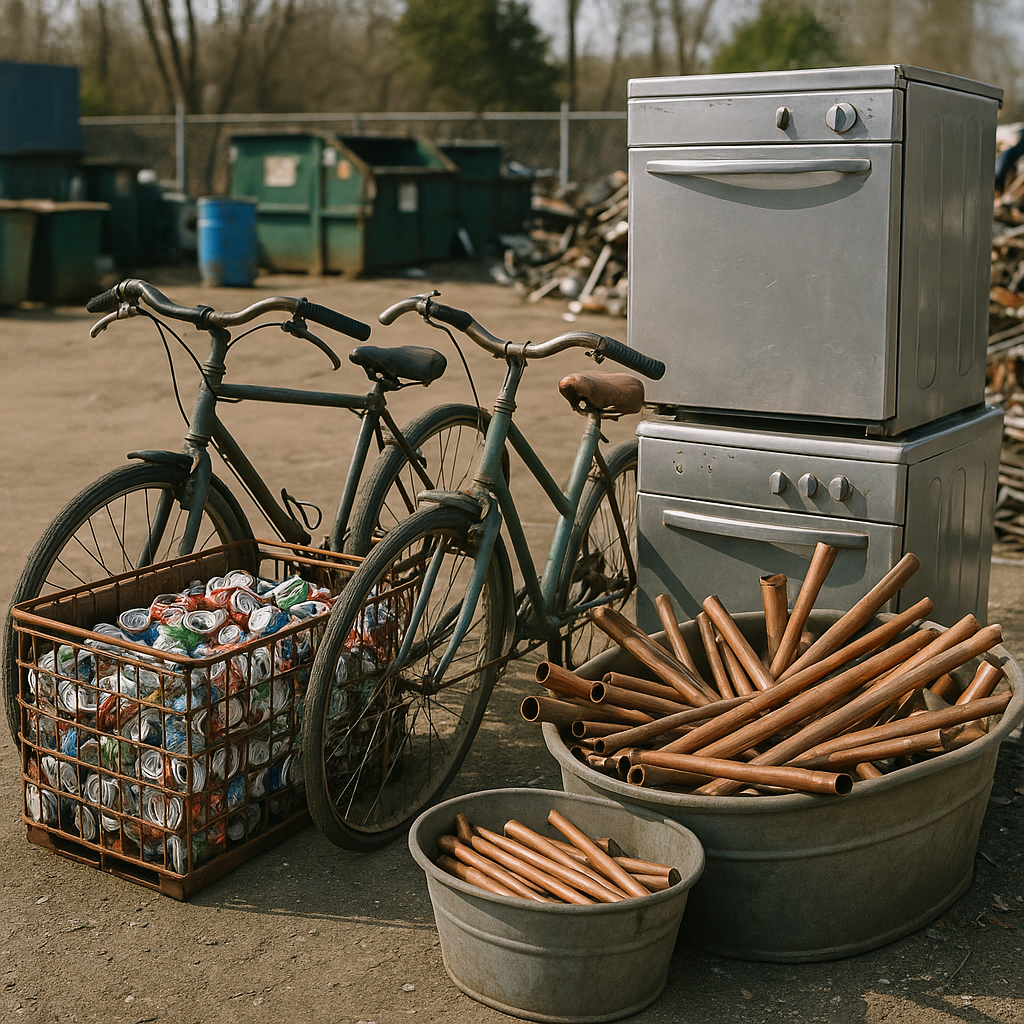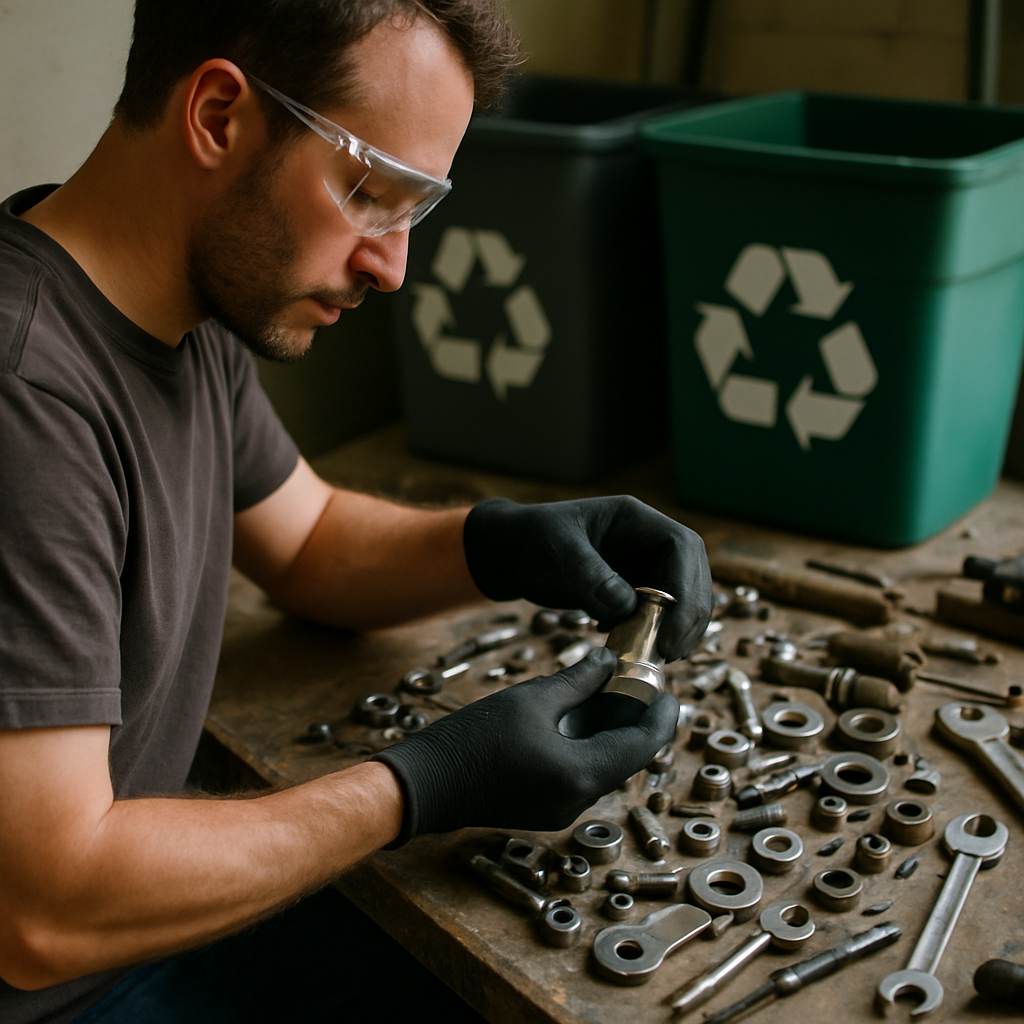5901 Botham Jean Blvd, Dallas, TX 75215
Recycle Scrap Metal Locally: Accepted Materials, Price Ranges, and Best Practice
August 20, 2025Scrap metal recycling transforms what many consider waste into valuable resources. This process involves collecting discarded metal materials, sorting them by type, processing them through shredding or crushing, and melting them down to create new products. From old vehicles and appliances to construction materials and electronics, scrap metal comes from various sources in our everyday lives.
Unlike many materials that degrade during recycling, metals maintain their quality regardless of how many times they’re recycled. This makes metal one of the most environmentally friendly materials to recycle. The environmental benefits are substantial. Recycling aluminum saves up to 95% of the energy required for virgin production. Steel recycling reduces energy consumption by 60%, while copper recycling cuts energy use by 85%.
Beyond environmental advantages, metal recycling drives significant economic benefits. The industry generates over $100 billion in economic activity annually and creates hundreds of thousands of jobs. For businesses, using recycled metals means lower raw material costs and reduced energy expenses. For communities, it means less mining impact, lower greenhouse gas emissions, and extended landfill lifespans. These combined environmental and economic advantages make scrap metal recycling a cornerstone of sustainable resource management and the circular economy.
What Types of Scrap Metal Can Be Recycled Locally?

Local recycling centers accept a wide variety of scrap metals. Knowing what can be recycled helps maximize the environmental and economic benefits of metal recycling. The first step is to identify and separate your metals properly.
Ferrous vs. Non-Ferrous Metals
The simplest way to identify your metal type is with a magnet. If it sticks, you have ferrous metal like iron or steel. If not, you have non-ferrous metal such as aluminum, copper, or brass.
Ferrous metals contain iron and are magnetic. While typically having a lower scrap value, recycling centers accept them because they’re highly recyclable. Steel is one of the most commonly recycled materials worldwide.
Non-ferrous metals don’t contain iron and aren’t magnetic. These metals generally command higher prices at recycling centers due to their value and versatility. They are worth carefully separating before you bring them to a facility.
Common Recyclable Household Metals
Aluminum is widely recycled, found in cans, gutters, siding, window frames, and doors. While not the most valuable metal, recycled aluminum saves 80% of the energy used to produce it originally, making it environmentally significant.
Copper is one of the most valuable recyclable metals, found in plumbing pipes, electrical wiring, roofing materials, and air conditioning units. Its distinctive reddish color makes it relatively easy to identify.
Brass, a yellowish alloy of copper and zinc, is common in keys, door handles, bathroom fixtures, and plumbing components. It has moderate recycling value but is quite heavy, so it adds up quickly.
Steel is extremely common in household items, including shelving, cabinets, appliances, and car parts. Though not highly valuable by weight, it’s infinitely recyclable without losing quality.
| Metal Type | Common Household Items |
|---|---|
| Aluminum | Cans, foil trays, window frames |
| Steel | Tools, shelving, appliances, bed frames |
| Copper | Wiring, pipes, plumbing fixtures |
| Brass | Door knobs, locks, plumbing components |
| Cast Iron | Pots, pans, sewer pipes |
| Stainless Steel | Sinks, cookware, dishwasher interiors |
Specialty Recyclable Metals
Apart from everyday items, many recycling centers accept specialty metal products. Catalytic converters from vehicles contain valuable metals like platinum, palladium, and rhodium. Rechargeable batteries contain nickel, cobalt, and other metals worth recovering.
Stainless steel from kitchen appliances and cookware is widely accepted. Many facilities also take chrome fixtures, lead items like old plumbing components, and even medical devices containing recyclable metals.
Check with your local recycling center before bringing in unusual items. Most facilities have specific handling procedures for certain types of metal waste to ensure proper processing and environmental compliance.
What Should I Know Before Recycling Scrap Metal?

Recycling scrap metal is both environmentally responsible and potentially profitable. Proper preparation helps ensure you get the best value for your materials and contribute effectively to the recycling stream. Understanding a few key aspects beforehand can make your experience smoother and more rewarding.
Metal Sorting Essentials
The most fundamental step in recycling scrap metal is proper sorting. Sorting your metals ensures you receive fair compensation and facilitates efficient recycling processing.
Use a simple magnet test to determine if your metal is ferrous or non-ferrous. If the magnet sticks, you have ferrous metal like steel or iron. If it doesn’t, you have non-ferrous metal such as copper, aluminum, or brass, which typically commands higher prices.
Further separate your metals by type to maximize value. Common categories include:
- Copper (reddish-brown, found in plumbing and electrical wiring)
- Aluminum (lightweight, silvery, found in cans and siding)
- Brass (yellowish with hints of red, found in fixtures and hardware)
- Steel (often magnetic, commonly rusts)
- Stainless steel (silvery, non-magnetic in most cases)
Preparation Steps
Clean metals fetch better prices and are easier to recycle. Prepare your scrap properly before transport:
- Remove non-metal attachments like plastic, rubber, or wood
- Clean off excessive dirt, paint, or grease
- For copper wire, consider stripping the insulation for higher value
- Store sorted metals in separate containers or bins
- Consolidate smaller pieces of the same metal type
For insulated copper wire, check with your recycling facility first. Some accept it as-is, while stripping the insulation yourself can significantly increase its value.
Recycling Center Requirements
Before loading up your vehicle, research your local recycling center’s requirements:
Many facilities require proof of residency or identification, so bring your driver’s license or other valid ID. Call ahead to verify operating hours, accepted materials, and any specific preparation requirements they might have.
For large items or industrial quantities, inquire about pick-up services. Some recycling centers offer transportation options that can save you time and effort, especially for commercial quantities.
| Carbide | $5.32/lb |
| Carbide Inserts/Shapes | $6.00-$6.75/lb |
| Tantalum | $25.00-$75.00/lb |
| Lithium Ion Batteries | $1.50-$2.50/lb |
| Platinum | $1,050/oz |
| Rhodium | $6,500/oz |
| Nickel | $2.50-$3.00/lb |
| Lead | $0.44/lb |
| Aluminum (LME Price) | $1.11/lb |
| Inconel | $2.00-$2.75/lb |
Understanding Market Prices
Scrap metal prices fluctuate based on market conditions, quality, and quantity. Research current rates before visiting a recycling center to ensure fair compensation. Non-ferrous metals like copper and brass typically command higher prices than ferrous metals like steel and iron.
Consider timing your recycling trip when prices are favorable. Some recyclers post their current rates online or will provide quotes over the phone. Accumulating larger quantities of well-sorted metal can also lead to better pricing.
Safety Guidelines
Handling scrap metal requires caution to prevent injuries:
- Wear thick gloves to protect against sharp edges
- Use safety glasses to shield your eyes from metal fragments
- Wear sturdy closed-toe shoes when handling heavy pieces
- Use proper lifting techniques for heavier items
- Secure loads properly during transport to prevent shifting
Be especially cautious with items that may contain hazardous materials. Some appliances contain components that require special handling. When in doubt, ask the recycling center about proper disposal methods.
Properly sorting, cleaning, and transporting your scrap metal maximizes your return and ensures the materials enter the recycling stream efficiently. This preparation helps recycling centers process materials more effectively, reducing waste and conserving valuable resources.
Conclusion: Making an Impact Through Local Scrap Metal Recycling

Recycling scrap metal locally creates significant benefits. Every piece of metal diverted from landfills conserves natural resources, reduces pollution, and decreases greenhouse gas emissions. The environmental impact is substantial: recycling one ton of steel prevents the release of 1.5 tons of carbon dioxide, saving vital raw materials like iron ore, coal, and limestone.
Beyond environmental advantages, local scrap metal recycling boosts community economies by creating jobs, generating tax revenue, and supporting manufacturing. These recycling initiatives unite communities through shared sustainability goals and educational opportunities. By participating in proper metal recycling practices, you contribute to a cleaner environment and a stronger local economy. Contact Okon Recycling at 214-717-4083 for guidance on responsibly recycling your scrap materials and join the movement toward creating a truly circular economy in your community.
